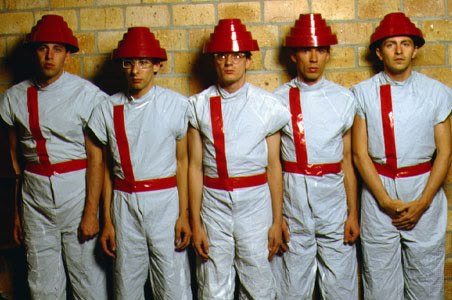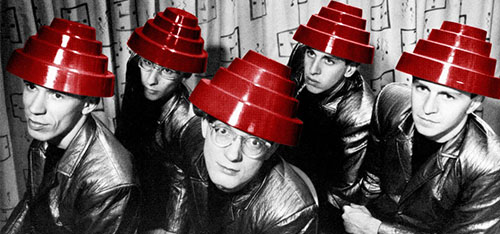Devo gained a new level of visibility with 1980's Freedom of Choice which included their best-known hit,
"Whip It", which quickly became a Top 40 hit. The album moved to an almost completely electronic sound,
with the exception of acoustic drums and Bob 1's guitar. The tour for "Freedom of Choice"
featured the band performing in front of large custom light boxes which could be laid on their back to form a second,
smaller stage during the second half of the set. Other popular songs from "Freedom of Choice" were "Girl U Want,"
the title track (both of which had popular music videos, along with "Whip It"), and "Gates of Steel".
 Devo made two appearances on the TV show Fridays in 1980, as well as on Don Kirchner's Rock Concert, American Bandstand, and other shows.
Devo made two appearances on the TV show Fridays in 1980, as well as on Don Kirchner's Rock Concert, American Bandstand, and other shows.
The band remained popular in countries such as Australia,
where the nationally broadcast 1970s–1980s pop TV show Countdown was one of the first programs in the world to broadcast their video clips.
They were given consistent radio support by Sydney-based noncommercial rock station Double Jay (2JJ)
and Brisbane-based independent community station Tripple Zed (4ZzZ),
two of the first rock stations outside America to play their recordings.
The late-night music program Nightmoves aired The Truth About De-Evolution. This paid off, as in August 1981,
they found commercial success in Australia when their Devo Live E.P. spent 3 weeks at the top of the Australian charts.
In 1982, they toured Australia and appeared on the TV show Countdown.
 In 1981, Devo contributed a cover of "Working in the Coal Mine," recording during the Freedom of Choice sessions,
to the film Heavy Metal. "Coal Mine" would be a pack-in bonus single with their 1981 release, New Traditionalists.
This album brought a new look for Devo, who wore self-described "Utopian Boy Scout uniforms"
topped with a plastic "New Traditionalist Pomp," a plastic half-wig modeled on the hairstyle of John F. Kennedy.
Among the singles from the album was "Through Being Cool," written as a reaction to their newfound fame from "Whip It," an attack on their new fans that misinterpreted the song—and Devo's—message.
The album's accompanying tour featured the band performing an intensely physical show with treadmills and a large Greek temple set.
Oh, No! It's Devo followed in 1982. Produced by Roy Thomas Baker, the album featured a darker,
more sinister sound than its predecessors. According to Gerald Casale,
the album's sound was inspired by reviewers calling them "fascist clowns" in articles.
In 1981, Devo contributed a cover of "Working in the Coal Mine," recording during the Freedom of Choice sessions,
to the film Heavy Metal. "Coal Mine" would be a pack-in bonus single with their 1981 release, New Traditionalists.
This album brought a new look for Devo, who wore self-described "Utopian Boy Scout uniforms"
topped with a plastic "New Traditionalist Pomp," a plastic half-wig modeled on the hairstyle of John F. Kennedy.
Among the singles from the album was "Through Being Cool," written as a reaction to their newfound fame from "Whip It," an attack on their new fans that misinterpreted the song—and Devo's—message.
The album's accompanying tour featured the band performing an intensely physical show with treadmills and a large Greek temple set.
Oh, No! It's Devo followed in 1982. Produced by Roy Thomas Baker, the album featured a darker,
more sinister sound than its predecessors. According to Gerald Casale,
the album's sound was inspired by reviewers calling them "fascist clowns" in articles.
The album's tour featured the band performing seven songs in front of a 12-foot high rear-projection screen with synchronized video,
an image recreated using blue screen effects in the album's accompanying music videos.
Devo also contributed two songs, "Theme from Doctor Detroit" and "Luv-Luv" to the 1983 Dan Aykroyd film Doctor Detroit,
and produced a music video for "Theme from Doctor Detroit" featuring clips from the film with live action segments.
Devo released their sixth album, Shout, in 1984 to mixed reviews.
The album has been criticized for its overuse of the Fairlight CMI synthesizer, and weak songwriting.
However, the band's cover of the Jimi Hendrix classic "'Are You Experienced?" and the accompanying music video received some praise.
Following the commercial failure of Shout, Warner Bros. dropped Devo from their label.
Shortly after, claiming to feel creatively uninspired, Alan Myers left the band.
This caused the band to abandon the plans for a "Shout" video LP, as well as their tour for the album.
During the interim, Mark Mothersbaugh began composing music for the TV show Pee-Wee's Playhouse,
and released an elaborately packaged solo cassette, Musik for Insomniaks, which was later expanded and released as two CDs in 1988.









 Devo made two appearances on the TV show Fridays in 1980, as well as on Don Kirchner's Rock Concert, American Bandstand, and other shows.
Devo made two appearances on the TV show Fridays in 1980, as well as on Don Kirchner's Rock Concert, American Bandstand, and other shows. In 1981, Devo contributed a cover of "Working in the Coal Mine," recording during the Freedom of Choice sessions,
to the film Heavy Metal. "Coal Mine" would be a pack-in bonus single with their 1981 release, New Traditionalists.
This album brought a new look for Devo, who wore self-described "Utopian Boy Scout uniforms"
topped with a plastic "New Traditionalist Pomp," a plastic half-wig modeled on the hairstyle of John F. Kennedy.
Among the singles from the album was "Through Being Cool," written as a reaction to their newfound fame from "Whip It," an attack on their new fans that misinterpreted the song—and Devo's—message.
In 1981, Devo contributed a cover of "Working in the Coal Mine," recording during the Freedom of Choice sessions,
to the film Heavy Metal. "Coal Mine" would be a pack-in bonus single with their 1981 release, New Traditionalists.
This album brought a new look for Devo, who wore self-described "Utopian Boy Scout uniforms"
topped with a plastic "New Traditionalist Pomp," a plastic half-wig modeled on the hairstyle of John F. Kennedy.
Among the singles from the album was "Through Being Cool," written as a reaction to their newfound fame from "Whip It," an attack on their new fans that misinterpreted the song—and Devo's—message.